
July 19, 2013, by Zoë Goodwin
Picturing Politics: The future of Trident
Picturing Politics, a blog produced by the School of Politics and International Relations at the University of Nottingham is host to a series of audio and video clips featuring academics commenting on the political significance of a diverse range of images.
The Conservatives and the Liberal Democrats have clashed over the replacement of Trident – an operational system of four Vanguard-class submarines armed with Trident missiles. Whilst the Conservatives want to see a like-for-like replacement for the four boat fleet, the Liberal Democrats want the fleet reduced to three boats. In the ninth Picturing Politics blog, Dr David Gill looks at the history behind the four boat fleet.
Gill starts by explaining Cameron’s reasons for wanting to replace the four submarines. He stressed that a nuclear deterrent provides an insurance policy that the UK cannot do without. And although the Liberal Democrats are opposed, it looks likely that the government will eventually opt for a similar replacement.
However the question of how many submarines should be commissioned is still explored by many politicians, economists and strategists.
Gill argues that too few may jeopardise Cameron’s desire for a credible and continuous deterrent but too many may risk unnecessary expenses.
Gill goes on to argue that looking at events which took place almost five decades ago may shed some light on the strategic challenges soon to be facing the British government.
In 1964, the Labour government, under Harold Wilson chose to defend continued investment in the Polaris programme namely Britain’s first submarine based nuclear force. Soon after this decision was made, the question of size became one of the government’s most pressing strategic concerns.
A series of complex and heated debates were had, debates which reflect the broader context of the decision itself with government’s economic woes competing with its desire to maintain a strong international presence. And Gill argues that although strategic imperatives ultimately took precedence over the Treasury’s concerns, economic considerations certainly tempered the Ministry of Defence’s ambitions.
The most appropriate compromise at the time was to commission four submarines providing an effective but less costly national nuclear deterrent. This four submarine status quo has remained for over five decades.
Gill goes on to argue reasons for why a three boat fleet may be favoured and then why a four boat may be favoured before concluding that the lengthy precedence of a four boat force may also affect future debate, making Wilson’s decision to continue to influence British nuclear policy way into the 21st century.
To listen to the full clip, click here.
No comments yet, fill out a comment to be the first

Leave a Reply